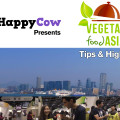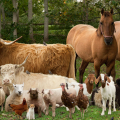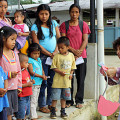Overstimulated. Thats how I felt when I returned to Europe after 8 years working and living in Latin America. It became apparent to me that the media have to SHOUT to get our attention; overpopulation, sustainability of food production, loss of natural resources, animal welfare, human health, and so on. Information overload.
Two years later saw the start of Veganbnb Travel; vegan adventure holidays in Guatemala and Spain and the information overload in question led me to create a project designed to encourage conscious consumerism by connecting consumers to producers.
Looking Behind The Label
 In Guatemala I shop on the local market. I purchase fruit from one family, vegetables from another, dry goods such as rice from a small supermarket and coffee directly from the coffee plantation which takes me ten minutes to travel to on my motorbike. Occasionally I have to wait patiently for the coffee to be roasted, during which time I have the opportunity to walk through the coffee plantation and speak to the workers picking the coffee from the bushes (quite a laborious task; hours are long and wages low but it is still a valuable source of income).
In Guatemala I shop on the local market. I purchase fruit from one family, vegetables from another, dry goods such as rice from a small supermarket and coffee directly from the coffee plantation which takes me ten minutes to travel to on my motorbike. Occasionally I have to wait patiently for the coffee to be roasted, during which time I have the opportunity to walk through the coffee plantation and speak to the workers picking the coffee from the bushes (quite a laborious task; hours are long and wages low but it is still a valuable source of income).
I recently went looking for chia seeds (known as chan in Guatemala) on the market and was informed that there was a shortage. However, because they knew me from my weekly shop, I was told if I waited half an hour that they would source them for me. Now that’s customer service for you!
When I first returned to Europe, I spent time with family and friends in the UK and found myself on a shopping trip one day having been designated the task of the weekly shop for a family member. After spending around half an hour in a large supermarket, something struck me. I felt completely disconnected with the products that were going in my shopping basket, and when I assessed what was actually in there I realized that this feeling of disconnection had influenced my consumer choices—so much so that I went around the whole supermarket picking everything up and looking behind the labels in an attempt to establish some kind of connection (to at least the country of production…information on the actual producers was just not available).
After mentally working my way through the overstimulation and mounds of information driven by popular media regarding what we should be doing to live a better, more compassionate, more sustainable lifestyle, I was left feeling slightly paralyzed with options and information and struggled to see how, as individuals, we could make a difference. But I persevered in connecting the dots!
On the basis that we, people on all corners of the world, are consumers, and on seeing how my personal consumer choices differed when I felt disconnected to the producers, the aim for my project became clear. The seed was planted and Looking Behind The Label was born.
Looking Behind The Label will encourage everyone to look at the delicate links which connect producers, products and consumers to international trade in a bid to promote conscious consumerism and counteract current systems in place which are destabilizing the planet.
On a base level, consuming consciously means just taking an extra five or ten seconds before making a consumer choice—potentially saving money, encouraging the purchase of food and consumable produce that will benefit our health, and supporting brands which treat people, animals and the environment with respect.
On a larger and more long term scale, conscious consumerism can help alleviate poverty and improve the lives of families both in the developed and underdeveloped world, all this just by taking an extra few seconds to think about our choices as consumers. So easy to implement!
The Labels
Produce: Think about the last time you went shopping. Did you see any organic labels amongst the produce or products on the shelves?
Clothing: Have a quick look at the clothes you are wearing right now. Do the labels tell you where your T-shirt was produced?
Cosmetics: How many different cosmetics have you used already today? What was on the label of those bottles?
 There are numerous labels, some of which we associate with on some level, but how much do we really know about them? Let us take the label organic. Look behind it and question it a little further. Organic produce tends to be pricey…why? If you were to visit an organic coffee farm in Guatemala, you would begin to appreciate that in many cases, organic farming is far more labour intensive. Because the land is absent of pesticides and chemicals typically used to eliminate weeds, this has to be replaced by hours of intense physical labour, thus increasing the production costs at a base level. That means that by the time those delicious coffee beans reach your supermarket shelf in a nice shiny packet, it is more likely they will have a higher price tag than other non-organic brands.
There are numerous labels, some of which we associate with on some level, but how much do we really know about them? Let us take the label organic. Look behind it and question it a little further. Organic produce tends to be pricey…why? If you were to visit an organic coffee farm in Guatemala, you would begin to appreciate that in many cases, organic farming is far more labour intensive. Because the land is absent of pesticides and chemicals typically used to eliminate weeds, this has to be replaced by hours of intense physical labour, thus increasing the production costs at a base level. That means that by the time those delicious coffee beans reach your supermarket shelf in a nice shiny packet, it is more likely they will have a higher price tag than other non-organic brands.
Did you check the label on your T-shirt? Do you know which countries produce cotton? How is cotton harvested? Is the farming of cotton profitable in comparison to the price we are paying for our clothing?
The next time you have a cup of coffee, take a moment to consider this: how long does it take you to drink a cup of coffee? How long do you think it would take you to pick half a pound of coffee?
If the basic concept of Looking Behind The Label was promoted, I believe that we would begin to take the extra five seconds and consume more consciously, resulting in the purchase of food, consumable produce and other goods which benefit our health, and the supporting of brands which treat people, animals and the environment with respect.
On a larger and more international scale, our consumer choices in the western world can, and do, affect the lives of those in developing and underdeveloped countries.
I believe that everyone should have far more than a suntan as a reminder of their holidays, and after many years working in the tourism industry, I am dedicated to adding value to travel and on a larger, more worldly scale. I would like to create an environment where we understand not only the price of things, but the value.
About the author: Emma Fry is the owner and founder of Veganbnb Travel, vegan adventure holidays in Guatemala and Spain. For more on trips and vegan friendly travel go to www.veganbnbtravel.com. Promoting the availability of a lifestyle in which animals and the environment are not exploited, one holiday at a time.






No Comments